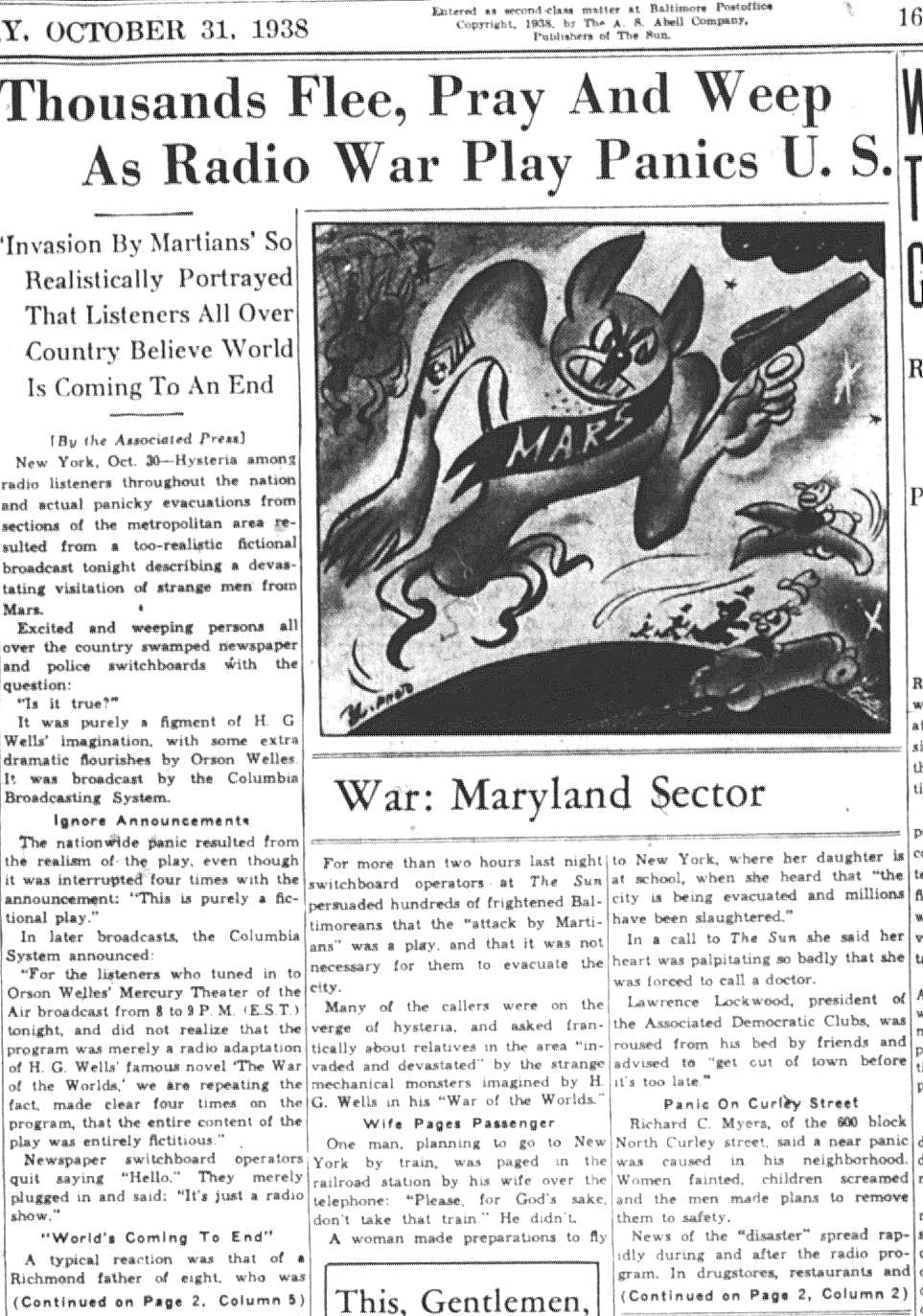Oct. 30, 1938, was a cool autumn Sunday evening. Baltimoreans were still celebrating Johns Hopkins’ win over Haverford College, 7-6, after Charlie Rudo made a stunning 80-yard touchdown run in the third quarter, while Navy and Penn tied in a scoreless gridiron slugfest.
There was more exciting sports news in the air. On Tuesday, the War Admiral-Seabiscuit match race would open a “Brilliant Meeting,” reported The Sun at Pimlico Race Course, while the glamorous New York debutante Brenda Frazier had attended the Velvet Ball that weekend.
All this was set against troublesome news from abroad as England Prime Minister Neville Chamberlain attempted to “satisfy Germany’s renewed colonial demands,” The Sun reported.
After dinner, settling into comfortable chairs and sofas, Baltimoreans switched on their Atwater Kent, Zenith or RCA radios for an evening’s entertainment and an experience they would remember for the rest of their lives.
At 8 p.m., WFBR broadcast “Edgar Bergen: ventriloquist; Charlie McCarthy; Don Ameche, director,” while a turn of the dial offered “Out West” on WBAL, and “Westminster Presbyterian Church” that aired over WCBM.
At the same hour on WCAO, Orson Welles’ “The Mercury Theatre on the Air” was presenting an hourlong adaptation of H.G. Wells’ novel “The War of the Worlds.”
By the time it ended, it would prove to have been a historic hour of radio that delivered a colossal Halloween joke on terrified listeners from coast to coast.
Following a routine weather forecast, the announcer said, “We take you now to the Meridian Room in the Park Plaza in downtown New York for the music of Ramón Raquello and his orchestra.”
As the music began, the announcer broke in with a bulletin.
“We interrupt our program of dance music to bring you a special bulletin from the Intercontinental Radio News. Twenty minutes before 8, Professor Farrell, of the Mount Jennings Observatory, Chicago, Illinois, reports observing several explosions of incandescent gas occurring at regular intervals on the planet Mars.”
The announcer continued. An unidentified object was reported “moving toward Earth with enormous velocity, like a jet of blue gas shot from a gun. We return you now to our New York studio.”
Though there was an announcement at the beginning of the broadcast — and repeated four times — during the program that it was an adaptation of Wells’ novel, the panic was on from Manhattan to Los Angeles, from Detroit to Key West.
Dance music was interrupted by more frequent bulletins until an announcer on the scene intoned that a “giant tube of metal” had landed in Grovers Mills, New Jersey, his voice rising in panic, “Look! The damn thing’s unscrewing. Keep back I tell you. Maybe there’s men in it. It’s red-hot. Keep those idiots back.”
Out came Martians toting death-ray guns who killed 200 as “a heavy black fog — of extreme density, nature unknown,” headed toward Manhattan.
“The governor of New Jersey has declared martial law,” and a reporter in New York chimed in, “All communications with New Jersey are closed. Our Army wiped out. Cylinders from Mars falling all over the country. One outside Buffalo, another Chicago — St. Louis. The bells you hear ringing are to warn the people to evacuate the city as Martians approach.”
“Just as the continent was ‘toppling’ onto oblivion, the program’s real CBS announcer cut in to explain they had been listening to the dramatization of Wells’ book.

In a 1957 article in The Sun recalling that night, the Sunpapers’ drama critic, Donald Kirkley, recalled the persistent ringing of his apartment doorbell.
“I was confronted by a white-faced, shaking lady who occupied the next apartment. ‘New Jersey is being attacked by Martians,’ she assured me. “Everybody is being killed. I heard it on the radio — on a newscast. You work for the Sunpapers — please do tell me what to do.'”
“I started shaking, too, and made a beeline for the telephone,” Kirkley wrote.
“A long minute went by before I was connected with The Sun’s operator. She was tired already repeating what was to be repeated for another two hours: ‘It was only a radio play. There’s been no invasion. It was only make-believe,'” he wrote.
Before they stopped counting, the newspaper had received nearly 600 hysterical and panicky calls. Operators abandoned saying “Hello” and simply answered, “It’s a radio show.”
But the hysteria was on. A Mount Pleasant Avenue resident raced into the street screaming the words that ricocheted across the country: “The world is coming to an end! I just heard it on the radio!”
Reports reached The Sun that Preston, on the Eastern Shore, was “gripped by mass hysteria,” while the headline in the next day’s Sun summed up the nation’s jitters: “Thousands Flee, Pray and Weep As Radio Play Panics U.S.”
Baltimore jeweler Samuel Shapiro suffered a heart attack during the program and died two weeks later at Sinai Hospital, his doctor telling The Sun that his patient’s death was precipitated by the news that Martians had invaded New Jersey.
Frank P. McNinch, chairman of the Federal Communications Commission, called for an investigation, while Welles said that he was “just stunned by the reaction,” and expressed “deep regret” over what the broadcast had caused.
In a statement, CBS Radio said, “We regret that some listeners to the Orson Welles’ Mercury Theater [on] the Air program last night mistook fantasy for fact.”





